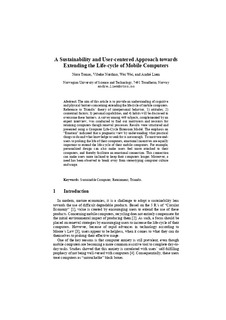A sustainability and user-centered approach towards extending the life-cycle of mobile computers
Journal article, Peer reviewed
Accepted version

Åpne
Permanent lenke
http://hdl.handle.net/11250/2596335Utgivelsesdato
2018Metadata
Vis full innførselSamlinger
- Institutt for design [1054]
- Publikasjoner fra CRIStin - NTNU [37219]
Originalversjon
10.1007/978-3-319-96068-5_88Sammendrag
The aim of this article is to provide an understanding of cognitive and physical barriers concerning extending the lifecycle of mobile computers. Reference to Triandis’ theory of interpersonal behavior, (1) attitudes; (2) contextual factors; (3) personal capabilities, and (4) habits will be discussed to overcome these barriers. A survey among 449 subjects, complemented by an expert interview, was conducted to find out motivators and resistors for retaining computers though renewal processes. Results were structured and presented using a Computer Life-Cycle Extension Model. The emphasis on “Emotion” indicated that a pragmatic view by understanding what practical things to do and what knowledge to seek for is not enough. To motivate end-users to prolong the life of their computers, emotional incentives are equally important to extend the life-cycle of their mobile computers. For example, personalized design can also make users feel more attached to their computers, and thereby facilitate an emotional connection. This connection can make users more inclined to keep their computers longer. Moreover, a need has been observed to break away from stereotyping computer culture and usage.